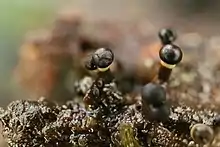| Elaeomyxa | |
|---|---|
 | |
| Elaeomyxa cerifera – photo by Peta McDonald | |
| Scientific classification | |
| Domain: | Eukaryota |
| Phylum: | Amoebozoa |
| Class: | Myxogastria |
| Order: | Physarales |
| Family: | Lamprodermataceae |
| Genus: | Elaeomyxa Hagelst., 1942 |
Elaeomyxa is a genus of slime molds in the family Lamprodermataceae.[1] As of May 2022, there are four known species in the genus.[1] Species in this genus have been documented in North America, Eurasia, Africa, and Australasia.[1]
Biology
The Elaeomyxa genus belongs to the true slime mold phylum Mycetozoa (also known as Myxomycetes) of fungus-like organisms that have at different times been classified in the protist, animal, and fungi kingdoms.[2][3] Like other true slime molds, Elaeomyxa species have distinct life cycle phases.[3] During the trophic (feeding or ingesting) stage,[lower-alpha 1] called the plasmodium, the slime mold ingests food in an amoeba-like manner.[3] The slime mold then transitions to the reproductive phase, in which fruiting bodies produce spores for reproduction.[3]
Species
The Elaeomyxa genus contains the following species:
Notes
- ↑ See: Saprotrophic nutrition for further information on the trophic stage.
References
- 1 2 3 4 5 6 7 "Elaeomyxa Hagelst". Global Biodiversity Information Facility. Retrieved 2022-05-05.
- ↑ "Myxomycetes". Encyclopedia Britannica. Retrieved 2022-05-05.
- 1 2 3 4 Lado, Carlos; Eliasson, Uno (2017). Myxomycetes: Biology, Systematics, Biogeography, and Ecology. Cambridge: Academic Press Books. p. 205.
- ↑ Zhang Bo; Li Yu (26 September 2017). "A new Stemonitis species and a new record of Elaeomyxa from China". Phytotaxa. 323: 83. doi:10.11646/PHYTOTAXA.323.1.7. Retrieved 26 May 2022.